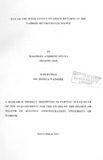| dc.description.abstract | According to the efficient market hypothesis, stock prices reflect all the market information
whether past, publicly held or private information. In an efficient market, investors should
expect to make only normal profits by earning a normal rate of returnon their investments.
There is an interesting contradiction to this hypothesis. This is the day of the week anomaly.
Other researchers have called this Monday effect, Friday effect and Weekend effect. There
have been observations in Finance Research that stock returns on Mondays are lower than
those of other days of the week. Likewise, equity returns on Fridays are higher than the other
trading days of the week.
This research investigates the Kenyan stock market to test whether the day of the week
anomaly exists. Daily market capitalization is used to compute the stock return and carry out
multiple regression from January 2008 to December 2011. The days excluded are public
holidays which fall between Monday and Friday. If a holiday falls on a Sunday, the preceding
day which is Monday is excluded since according to the Kenyan Government, this is a public
holiday.
The results obtained show that Tuesday has the highest positive return and Wednesday has
the highest negative return. Stock return volatility is highest on Tuesday and lowest on
Friday. The study concludes that there is no day of the week effect at the Nairobi Securities
Exchange | en |

